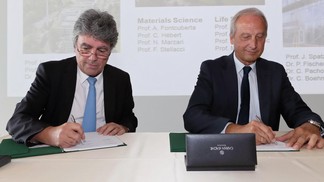The Max Planck Gesellschaft (MPG) institute has signed an agreement of partnership with EPFL, Switzerland to jointly establish a laboratory for Nanosciences research.
 EPFL President, Patrick Aebischer and Max-Planck-Gesellschaft President, Peter Gruss
EPFL President, Patrick Aebischer and Max-Planck-Gesellschaft President, Peter Gruss
MPG known for its 80 institutes and 17 Nobel Prizes has previously established research centers in many places worldwide. Some of these are National Centre for Biological Sciences in Bangalore, the research center at Princeton University and the Weizmann Institute in Israel.
According to the new agreement which was signed on July 16, 2012 at the EPFL campus, the Max Planck-EPFL Centre for Nanosciences and Molecular Technologies will be established at Lausanne. The research focus will be on two areas viz. fundamental Nanosciences and bio-nanotechnology. The center will open in early 2013 and will employ one scientist and two PhD students to begin with. The theses will be funded equally by both organizations and co-directed to promote an environment of collaborative studies involving Germany and Switzerland. The program will eventually take twenty PhD students on board with plans to fund six doctoral positions on a permanent basis. Twenty postdoctoral researchers will also be inducted into the program. The budget allocated for the first year is €960,000. The third year will see an infusion of €1.4 million. The program will commence in summer with a call for proposals for joint nanoscience projects in the fields of physics, material science, chemistry, electrical engineering and bio-engineering.